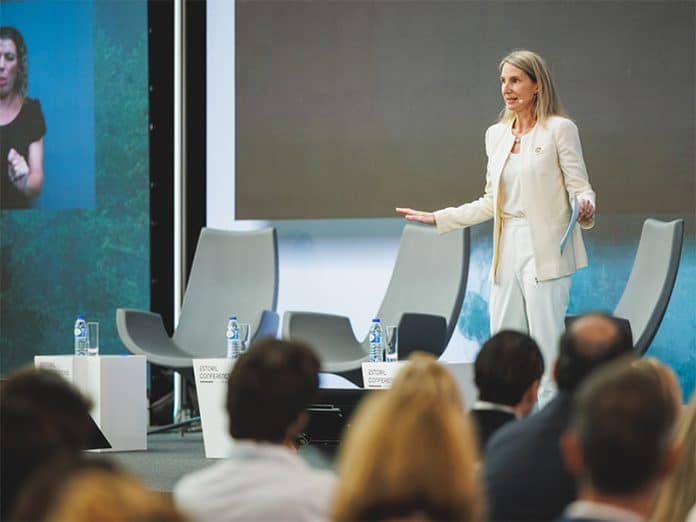The United Nations Regional Information Centre (UNRIC) is one of the institutional partners of the 9th edition of the Estoril Conferences, held under the theme “Time to Rethink.” Over two days, more than a thousand people are gathering in Cascais, Portugal, to engage in an intergenerational dialogue, bringing together voices from around the world to discuss humanity’s most pressing challenges. Marking UN Day, the event features several UN representatives and distinguished international speakers.
UNRIC Director Sherri Aldis is one of the keynote speakers at the conference. She presented her insights on “How the United Nations is Shaping the Future of Multilateralism: Upholding Information Integrity for Global Harmony.” During her talk, she highlighted recent efforts by the UN to reform the multilateral system, touching on key areas such as peace and security, human rights, climate action, and information integrity.
Coinciding with UN Day, the UN family had a strong presence at the conference, with contributions from Jorge Moreira da Silva, Executive Director of the United Nations Office for Project Services (UNOPS); Marta Lorenzo, Director of the UNRWA Representative Office for Europe; and Mónica Ferro, Director of the London Office of the United Nations Population Fund (UNFPA).
The talks addressed critical issues, including the environment, peace, policy, AI and technology, and health and longevity. Notable speakers included Olena Zelenska, First Lady of Ukraine; Marcelo Rebelo de Sousa, President of Portugal; José Ramos-Horta, President of East Timor and Nobel Peace Prize Laureate of 1996; and Oleksandra Matviichuk, Chairwoman of the Center for Civil Liberties and Nobel Peace Prize Laureate of 2022, among many others.
Message from the UN Secretary-General
The United Nations Secretary-General also sent a message supporting the event, emphasizing that this year’s theme, “It’s Time to Rethink,” aligns with the spirit of the Pact for the Future, adopted the previous month at the United Nations. The Secretary-General referred to this document as a historic call for reforms aimed at making global institutions more representative, fair, and effective, in line with the values of the UN Charter.
He highlighted that the Pact for the Future recognizes that 21st-century challenges demand 21st-century solutions. These solutions aim to create a world where dialogue and diplomacy lead to just and lasting peace, where global institutions reflect modern realities, where emerging technologies like artificial intelligence serve all of humanity with appropriate safeguards, and where efforts are made to dismantle systems perpetuating inequality in all its forms, including gender discrimination.
Pact for the Future
During her talk, UNRIC Director Sherri Aldis elaborated on the Secretary-General’s message, explaining the significance of the Pact for the Future. She described it as a once-in-a-generation opportunity for the international community to address both current and emerging global challenges and to reform outdated international institutions.
The Pact sets out a new roadmap for global cooperation over the coming decades, including breakthrough commitments in areas such as Security Council reform, outer space governance, international financing, and securing the rights of youth and future generations. Aldis also underscored the agreement among Member States on a Global Digital Compact, which represents the first truly universal agreement on the governance of artificial intelligence. This compact guarantees every country a seat at the AI table and commits all nations to ensuring global internet access, recognizing that access to reliable, accurate information is critical for an inclusive, safe, and secure digital space.
Information Integrity
Addressing the more than one thousand attendees, Sherri Aldis shared the UN’s vision for a world without digital divides, where everyone benefits from the digital economy, enjoys a secure digital space, and artificial intelligence is harnessed for the good of humanity. She explained how the UN is actively combating misinformation, disinformation, and hate speech—issues that affect people globally. Examples include young individuals driven to despair or suicide due to online bullying, female leaders receiving threats of rape and death, climate activists being attacked, and cancer patients being offered false cures.
According to Aldis, this digital disinformation is also compromising the work of the United Nations itself, affecting efforts related to sustainable development, human rights, and international peace and security. She pointed out that manipulated photos, videos, and even forged UN documents are becoming increasingly sophisticated and widespread with the advent of AI, particularly generative AI and deepfakes.
Rebuilding Trust
Aldis stressed the toxic nature of today’s information environments, noting how this “pollution” is tearing societies apart. One of the key consequences, she said, is the erosion of trust—trust in science, facts, institutions, and the media, as well as in those working to improve society. She further explained that the information ecosystem is becoming increasingly poisoned with conspiracy theories and hate, driven by algorithms that prioritize engagement and have normalized extremist views, including antisemitism, anti-Muslim bigotry, racism, and other forms of hate speech.
In response to this growing challenge, the UN is collaborating with the entire UN family, civil society, governments, media organizations, platforms, advertisers, academics, and fact-checkers to tackle these issues. Aldis highlighted the development of the United Nations Global Principles for Information Integrity—a guide aimed at safeguarding information integrity and combating the threats of misinformation, disinformation, and hate speech worldwide.

